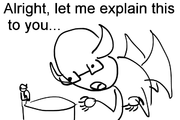Advice for Running a Quest
A basic guide on how to do run a Quest correctly, with advice written by various successful Quest Authors. These are all rules of thumb, and as such, can be broken when necessary, but following these is a good start.
Important Note: If you feel like you have any advice to give, go right ahead and add it! We are all ears.
Starting A Quest
Advice for preparing to make a quest.
Have Events Planned
Have a few different things planned that will happen to the protagonist, and think of a few ways he might react to them. Come up with a general idea of the order in which these things will happen, and a reason for them to happen.
Have Events Happen That The Protagonist Has Nothing To Do With
The rest of the world is still happening. Maybe some small time NPC we met 5 chapters ago got married since the last time we saw him. Or while we are out adventuring, we come home to find the city has a new mayor because the old one was caught cheating on his wife. Life still happens, and having a few things like this will help add realism to the world, and make the players think that more is out there than what we see.
Have an Ending Planned
This may sound like railroading to some, but knowing how you want to end it will help you have a goal in mind, and help you keep going and (hopefully) help you finish.
Running A Quest
Advice for once you have it off the ground.
Always Present Options
This is most important. There always needs to be something for the players to suggest, or else nothing can happen. So, do your best to give them something to work with. If they don't bite and do something entirely different, that's fine too, but at least they had options. There are a few guidelines to help ensure you are doing this, which can be tl;dr'd as follows:
- TestPattern: Yelling at PCs < Faffing about < Boring exposition < Interesting exposition < Stuff that reveals new options
- Farmer's Corollary: Cutscene your way to hell if you have to; do not stop to wait for a choice until there is a choice to be made.
Don't Present Options That Are Not Actually Options
- There is a path going left or right.
- >Go left
- The left passage ends in a locked door! Nothing else is here.
- >...Go right I guess
Don't do this. If you present options to them that don't actually affect anything if they are taken, don't present them. The locked door above could have easily been right at the intersection, and it would have worked just as well. Making people waste time doing things that aren't actually doing things directly relates to the guideline below this one.
However, in the above example, if we already happen to have the key for the door on the left, then it's not a false option. We could then use the key and proceed. If the key is actually down the right door, however, then the left door was never an option, and going right first was the only choice.
Don't Waste Updates
Don't have an update not actually update anything. If it doesn't present new information, new choices, or new stuff to work with, then it isn't really an update. For example, yelling at the players for being stupid is a waste of an update. Yelling at the players for being stupid and then pointing out information that they seem to have overlooked is not great, but better.
Always Have Ideas (But Don't Get Too Attached To Them)
Even when your options are left open and possibly vague, it's good to still have a few 'correct decisions' thought of beforehand. This helps you plan ahead, prods the players towards possible courses of action when stuck, and gives you an idea of what might happen in your next update.
But if the players come up with something different, consider just rolling with it. Part of the fun of questing is the effect players have on it, and you might be surprised with the results.
Know When to Yield (AKA Listen To Their Theories)
Admit; you can't think of every possible thing. And the players will, sometimes, invariably, think of stuff that would never cross your mind. So, steal their ideas. Show no shame!
How often you'll do this depends on how crazy / random your players are, and how fast-and-loose you are handling your own plot. And when done well, they'll never notice you cheated. Hell, they might even think they 'guessed your plan', and that tends to make them happy. If you need examples, ask your favorite quest writers.
Ending a Quest
Advice on how to actually finish one of these things. (Finish? A Quest? HAH.)
End it with a Bang
People like a good show. Give it to them, and make them remember it forever.
